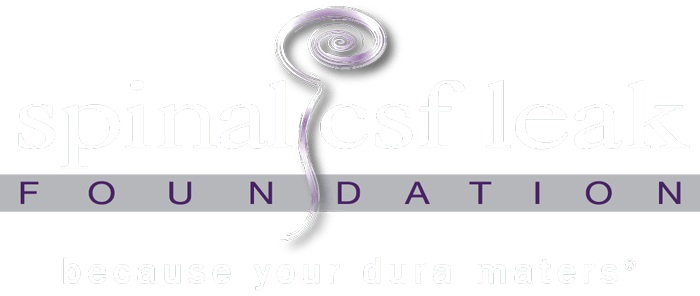
Jodi Blaszyk, PsyD, spinal CSF leak patient and clinical psychologist, discusses the second letter in her acronym ADAPT, for support in living with spinal CSF leak. To read the introduction to this series, click here.
The second letter in the ADAPT acronym is D, for Diagnosis
For many of us, finding out we have a spinal CSF leak involves a lengthy diagnostic search. I saw eight different specialists across three states in nine months.
During these visits, it was hard to put my symptoms into words while face-to-face with the providers. Sharing my experience of my leak with them was important for the diagnostic process. But each time I unpacked my story, I felt like it was a long trail of breadcrumb words that, despite a calendar and symptom journal, even I was challenged to make sense of. I also noticed that I felt worse after telling and retelling my story. It was like shaking up an emotional snow globe, with little chunks of fear and sadness floating in my head for days.
Sometimes, after these appointments, I wondered if I was believed by the doctors I’d seen. And often I myself was in disbelief. For a time, the story of the onset of my leak symptoms was all I had. But each time I retold it, I felt waves of doubt wash over me.
We are more than a diagnosis. The symptoms we experience are real, even when a diagnosis is elusive.
A personal experience
It is easy for the process of diagnosis to feel personal, and to feel as though you have failed if your spinal CSF leak or other signs of a leak do not show on imaging. Suddenly even our familiar story of symptom onset can feel useless, canceled out by the stark absolutism of tests and measurements and criteria. The word diagnosis means “to recognize” or “to know.” And it can be painful and stressful to feel unknown or unrecognizable. What can be helpful to remember is that we are more than a diagnosis. And that the symptoms we experience are real, even when a diagnosis is elusive.
Knowledge—and connection—is power
Fortunately, many spinal CSF leak patients do obtain a diagnosis. With a diagnosis, potential treatment on the horizon often brings feelings of joy and hope. But it can also be a time of worry and anxiety about what it means to have a spinal CSF leak, and the unknowns that lie ahead in terms of treating it. This can be mitigated by learning about the diagnosis and connecting with others who are experiencing the same thing.
The Spinal CSF Leak Foundation’s “Diagnosis” page is a good place to start, as well as the “Resource Documents” page, which features guides for patients, explainers, and informational brochures. The online spinal CSF leak community at Inspire is a welcoming place to connect with other people living with spinal CSF leak.
Grief, too, can accompany the relief of having a diagnosis, and that is important to acknowledge. Speaking with a trusted counselor or therapist can be helpful in understanding and processing this very natural reaction.
Seeking support
It’s clear that mental health plays a big role in the process of both obtaining and coping with a diagnosis. Unfortunately, in our culture mental health issues are often overlooked and remain stigmatized. It’s important to acknowledge the difficulties of diagnosis, and to seek support, whether through information, community, talking with a therapist, or a combination of all three.
Click here to read about the next letter in our acronym: A, for Advocate and educate.
Further Reading
Overview
Diagnosis
Resource Documents
This content is provided for general informational and educational purposes only and is not intended or implied to be a substitute for professional medical advice, help, diagnosis, or treatment. If you think you have an emergency, please call your doctor or emergency services immediately. To find a mental health provider, you can visit the ADAA Find a Therapist directory. If you are in a mental health crisis, call the National Suicide Prevention Lifeline at 988 or reach out to the Crisis Text Line by texting HOME to 741741 to connect with a crisis counselor.
